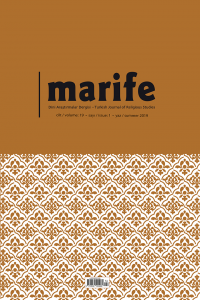
Marife Dini Araştırmalar Dergisi
Yazarlar: Hafzullah GENÇ
Konular:Din Bilimi
DOI:10.33420/marife.909923
Anahtar Kelimeler:Kalam,Qualities,Knowledge,Knowledge of particulars,Avicenna
Özet: Within his philosophical system, Avicenna’s opinion on “how God knows the particulars” is a significant ongoing debate that continues today. While Avicenna was explaining his opinion, he first claimed that God does not know the particulars, and then later on he suggested the opposite. This situation indicates that Avicenna might have been in a contradiction. However, there is a small nuance here: Avicenna suggested that God doesn’t know mutaghayyirat which refers to particulars in motion. According to Avicenna mutaghayyirat is merely known with senses, but because God doesn’t have senses in the way we do, He doesn’t know mutaghayyirat. But, again in Avicenna's philosophy, nothing is beyond God’s knowledge. So here, the question of “how God knows mutaghayyirat” begs for an answer. Therefore, Avicenna made the necessary statement on this issue briefly as follows: “God knows himself. God is the reason for the existence of everything. Who knows the reason also knows the result. God knows everything since He is the reason for everything, and He knows himself. So, He universally knows everything with their reasons. Reasons are not mutaghayyir. Consequently, knowing mutaghayyirat through reasons does not cause His knowledge to change.” Ghazali criticizes philosophers and Avicenna’s views in his book “Tahafut al-falasifa”. In this book, he accuses Avicenna of heresy due to his opinions on God’s knowledge of particulars. Because according to Ghazali, when someone says God does not know particulars or He knows particulars because of their reasons, he ultimately means God doesn’t know some things. If God doesn’t know mutaghayyirat which is subjected to senses, He did not know that, for example, Zeyd believed after heresy or Prophet Mohammed(pbuh) declared prophethood. After this accusation, a discussion arose about which thought was accurate. Those who said that Avicenna was right wanted to explain his views on God’s knowledge. In both the classical and modern periods, explanations made by his supporters were criticized by Ghazali’s supporters. In the classical period, the explanation made by Kutbuddin Razi, which according to us was under-appreciated, offers a way for Avicenna to escape criticism on this issue. According to Kutbuddin Razi, Avicenna claims that God eternally knows everything and when the events will take place. According to this view, God has the knowledge of everything, their time of realization, including particulars, and thus the existence of everything and their time. Drawing from this idea, one might say that Avicenna was close to the Jabriyyah sect on the issue of destiny. And this claim could be backed up by pieces of evidence from his books. His words on the actions of humans have traces of Jabriyyah's way of thinking. The phrase "Man is mukhtar-looking mudztar" belongs to Avicenna and what he said afterward shows that he thinks the man is not free in his actions. Avicenna thinks that man’s actions necessarily depend on a reason. Also, he says this reason goes all the way up to God in the chain, He is the first reason, and everything is necessary because of/for Him. In this case, everything that exists because of a reason is necessary. Avicenna’s ideas on this issue can be seen as in between Jabriyyah and Ahl al-sunnah. Avicenna who draws closer to Jabriyyah on the existence of particulars, stands closer to Ahl- al sunnah on God’s Knowledge. In the thought of Ahl al-Sunnah, God eternally knows everything, knows their time, and knows without taghayyur/change in His person and knowledge. Avicenna also thinks similarly on the issue of God’s knowledge. He believes that God eternally knows everything, knows their time without taghayyur/change in His person and knowledge. However, Avicenna’s explanation about knowing things due to their reasons moves the issue elsewhere. This explanation he came up with to avoid attributing plurality to God bears other consequences. In this article, while we rely on Kutbuddin Razi’s explanation about Avicenna’s view on God’s knowledge and drawing from some of his statements about Avicenna’s views, his idea on God’s knowledge of things has been reevaluated. As a result, we have concluded that his ideas on how God knows particulars and furthermore how he knows everything is different than what people believe. This result, though seem to confirm the allegations that he said different things to hide his actual thoughts on the issue, also saves him from the allegations that claim he believed God does not know the particulars.